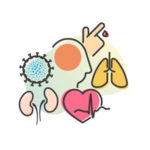Summer 2022 Vol. 12 Issue 02
-
From the Editor-in-Chief
RAS as an ‘Undruggable’ Drug TargetNew therapies are being developed to attack a previously untreatable cancer mutation.
by William G. Nelson, MD, PhD
-
Your Cancer Guide
Marking Cancer MilestonesFind unique ways to honor significant dates as you move forward after cancer treatment.
by Hester Hill Schnipper
-
Caregiving With Confidence
Learning Your LimitsAs a caregiver, you want to be there for your loved ones, but it's also necessary to take time for yourself.
by K.J. Bannan
-
Policy Matters
A Groundbreaking Report on COVID-19 and CancerThe report released by the American Association for Cancer Research includes a Call to Action that offers a roadmap for policymakers to better prepare and respond to the next pandemic.
by Antoni Ribas, MD, PhD
-
The Pain of Grief
People affected by cancer often experience intense feelings of loss when those around them die of the disease.
by Charlotte Huff
-
Comorbidity: Treating the Whole Patient
Patients with cancer often have at least one other chronic disease. Researchers hope to shine a light on how conditions and treatments interact in patients with chronic lymphocytic leukemia and other cancer types.
by Eric Fitzsimmons
-
Disparities in Cervical Cancer
Many women are being diagnosed with cervical cancer, despite the availability of tools to prevent and diagnose the disease. Black and Hispanic women and low-income and rural populations are especially vulnerable.
by Natalie Slivinski
-
Survivor Profile
Control What You CanBusiness leader CiCi Rojas takes life lessons from lymphoma.
by Lindsey Konkel Neabore
-
Q&A
Show Me You CareTheresa Brown, who was a nurse when she was diagnosed with breast cancer, writes about deep gaps in her own care.
by Marci A. Landsmann
-
Get Involved
Blankets of SupportTeenage cancer survivor provides comfort to children with cancer.
by Thomas Celona
-
Facts and Stats
Driving Down Lung Cancer DeathsScreenings, treatment advances and declines in smoking have led to a decrease in lung cancer death rates.
by Eric Fitzsimmons
Participating in a structured exercise program after treatment was associated with a reduced risk of recurrence in people who had colon cancer.
by Sandra Gordon
Gaps in Survivorship Care Leave Unmet Needs After Cancer TreatmentA survey of head and neck cancer survivors reveals that many are not getting adequate survivorship care and may not even know it is available.
by Cameron Walker
Improving Communication for Deaf Cancer PatientsAfter a cancer diagnosis, people who are deaf or have hearing problems can struggle if accommodations don’t meet their communication needs.
by Eric Fitzsimmons
Is Immunotherapy Right for People Hospitalized With Advanced Cancer?Researchers find no evidence that immune checkpoint inhibitors benefit cancer patients getting inpatient care. They urge earlier consideration of palliative care.
by Kyle Bagenstose



















